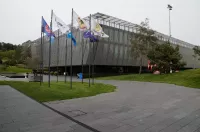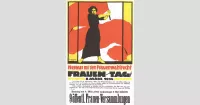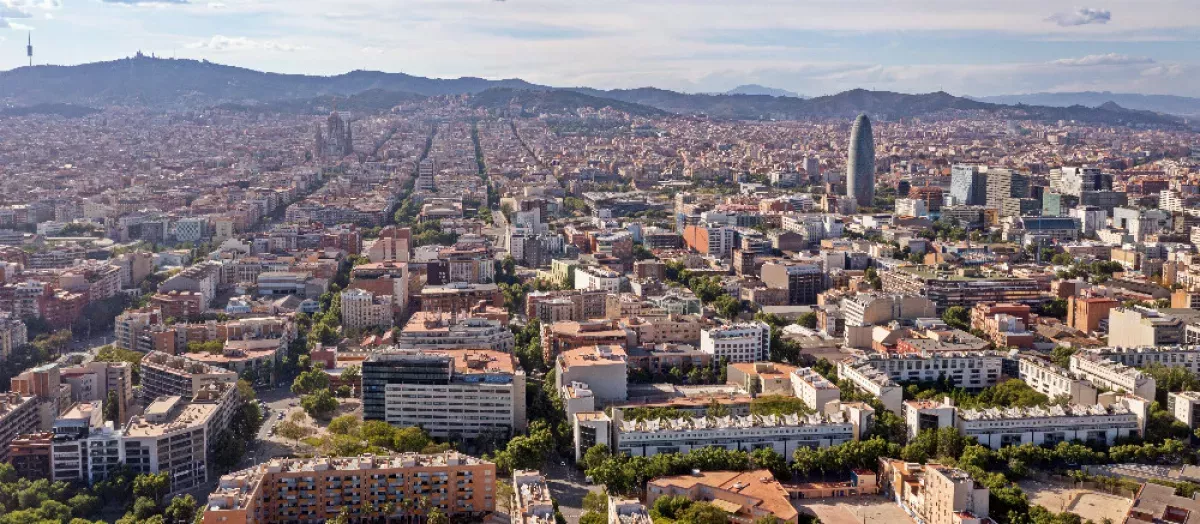Barcelona is a major city located on the northeastern coast of Spain, serving as the capital of Catalonia. As the second-most populous municipality in Spain, its city limits encompass approximately 1.7 million residents, while its broader urban area houses around 5.7 million individuals, making it a prominent metropolis in the European Union. Situated along the Mediterranean coast between the Llobregat and Besòs rivers, Barcelona is bordered to the west by the Serra de Collserola mountain range, marking it as one of the largest urban centers along the Mediterranean Sea.
1900: Barcelona population in 1900
In 1900, Barcelona had a population of 533,000.
1900: Population of children in Barcelona
In 1900, almost a third (28.9 percent) of the population were children (aged younger than 14 years).
1920: Establishment of Laboratori de Natura
The Laboratori de Natura was established at the Castle of the Three Dragons and functioned as the Zoology Museum from 1920 to 2010.
1924: Opening of Martorell Museum as geology museum
The Martorell Museum was opened to the public from 1924 to 2010 as a geology museum.
1929: Barcelona International Exposition
In 1929, Barcelona hosted the Barcelona International Exposition (Expo 1929).
1929: Barcelona Pavilion designed
In 1929, Mies van der Rohe designed the Barcelona Pavilion for the International Exposition for Germany. It symbolized modern architecture.
1930: Barcelona Pavilion Torn Down
In 1930, less than a year after it was constructed, the Barcelona Pavilion was torn down.
1930: Founding of Historical Botanical Garden
In 1930, the Historical Botanical Garden of Barcelona was founded.
1931: Barcelona becomes the capital of autonomous Catalonia
In 1931, Barcelona became the capital of autonomous Catalonia.
1931: Capital of autonomous Catalonia
In 1931, Barcelona became the capital of the autonomous region of Catalonia shortly after the establishment of the Second Spanish Republic.
1936: Barcelona as the epicenter of the Spanish Revolution
In 1936, Barcelona became the epicenter of the revolution experienced by Catalonia during the Spanish Revolution.
January 1939: Fall of Barcelona
On January 26, 1939, Barcelona fell, causing a mass exodus of civilians to the French border.
1939: Capture of Barcelona by fascists
In 1939, Barcelona was captured by the fascists.
1945: Focus of Barcelona Museum of Contemporary Art
The Barcelona Museum of Contemporary Art focuses on post-1945 Catalan and Spanish art.
1950: End of Catalan modernista architecture development
Catalan modernista architecture (related to Art Nouveau) developed between 1885 and 1950 and left a significant mark on Barcelona.
1950: Start of population absorbtion
In 1950, Barcelona started absorbing a high number of people from other less-industrialized parts of Spain.
1957: EADA Business School founded
In 1957, the EADA Business School was founded, becoming the first Barcelona institution to run manager training programs for the business community.
1960: First version of the Municipal Law passed
In 1960, the first version of Barcelona's special law, the Carta Municipal (Municipal Law), was passed.
1960: Focus of Can Framis Museum
The Can Framis Museum focuses on post-1960 Catalan Art owned by Fundació Vila Casas.
1975: Death of Franco brings democratization to Spain
In 1975, the death of Franco ushered in a period of democratization throughout Spain, with strong pressure for change in Barcelona.
September 1977: Massive demonstrations call for Catalan autonomy
In September 1977, massive demonstrations took place in Barcelona, assembling over a million people calling for the restoration of Catalan autonomy.
1979: Peak population of Barcelona
Barcelona's population peaked in 1979 at 1,906,998.
1982: Barcelona hosts FIFA World Cup matches
Barcelona hosted several matches during the 1982 FIFA World Cup.
1986: Barcelona's development promoted by two events
In 1986, Barcelona's development was promoted by Spain's accession to the European Community and its designation as host city of the 1992 Summer Olympics.
1986: Re-creation of Barcelona Pavilion
In 1986, Spanish architects constructed a modern re-creation of the Barcelona Pavilion in Barcelona.
1987: ETA car bombing at Hipercor
In 1987, an ETA car bombing at Hipercor killed 21 people.
1987: City divided into administrative districts
Since 1987, Barcelona has been divided into 10 administrative districts.
1990: Increase in Hotel Rooms and Green Areas
Between 1990 and 2004, as part of preparations for the Summer Olympics, there was an increase of 17% of the road capacity of the city, the sewage handling capacity by 27% and the amount of new green areas and beaches by 78%.
1990: Rise in tourism begins
In 1990, Barcelona had 1.7 million visitors, marking the start of a significant increase in tourism to the city.
1992: Barcelona hosts Summer Olympics
Barcelona hosted the Summer Olympics in 1992.
1992: Renovation of Estació del Nord for Olympic Games
In 1992, the Estació del Nord (Northern Station), a former railway station, was renovated to serve as the terminus for long-distance and regional bus services for the Olympic Games.
1992: Estadi Olímpic Lluís Companys used for the Olympics
The Estadi Olímpic Lluís Companys was used for the 1992 Olympics.
1992: Opening of beaches due to city restructuring for Summer Olympics
The city restructuring to host the 1992 Summer Olympics resulted in the opening of Nova Icària, Bogatell, Mar Bella, Nova Mar Bella and Llevant beaches.
1997: Industry in Barcelona metropolitan area
In 1997, the Barcelona metropolitan area housed 67% of the total industrial establishments in Catalonia.
1999: Barcelona wins RIBA Royal Gold Medal
In 1999, Barcelona won the RIBA Royal Gold Medal for its architecture, making it the first city to receive the award instead of an individual architect.
1999: OBC inaugurates new venue
In 1999, the Barcelona Symphony and Catalonia National Orchestra (OBC) inaugurated its new venue in the brand-new Auditorium (L'Auditori).
1999: Founding of Botanical Garden of Barcelona
In 1999, the Botanical Garden of Barcelona was founded.
2000: Lowest number of residents in Barcelona
After bottoming out in 2000 with 1,496,266 residents, the city's population began to rise again.
2000: Barcelona's cultural roots go back 2000 years
Barcelona's cultural roots go back 2000 years, with Catalan language promoted since the arrival of democracy.
2000: Barcelona hosts Bread & Butter urban fashion fair
Starting in the summer of 2000, Barcelona began hosting the Bread & Butter urban fashion fair.
2001: Population born outside of Spain
In 2001, 22.5% of the population was born outside of Spain, a proportion which has more than doubled since 2001.
2001: Reversal of population decline due to new immigration
Since 2001, Barcelona's population decline has been reversed due to a new wave of immigration.
2002: Inauguration of Diagonal Mar Park
Diagonal Mar Park, with 13.3 ha, was inaugurated in 2002.
2004: Hotel Rooms Double
Between 1990 and 2004, the number of hotel rooms in the city doubled.
2004: Barcelona city GDP per head
In 2004, Barcelona city had a very high GDP of €80,894 per head, according to Eurostat.
2004: Universal Forum of Cultures
In 2004, Barcelona hosted the Universal Forum of Cultures and the 2004 World Urban Forum.
2004: Construction of concrete bathing zone
The 2004 Universal Forum of Cultures left the city a large concrete bathing zone on the eastmost part of the city's coastline.
March 2006: Current version of Municipal Law approved
In March 2006, the current version of Barcelona's special law, the Carta Municipal (Municipal Law), was approved, organizing the city council and giving the local government special powers.
2006: CosmoCaixa wins European Museum of the Year Award
In 2006, CosmoCaixa, a science museum in Barcelona, received the European Museum of the Year Award.
March 2007: Start of Bicing service
On March 22, 2007, Barcelona's City Council launched the Bicing service, a public bicycle transport system. Users with a card can take a bicycle from any of the 400+ stations and leave it at another station. The service was successful, with 50,000 users in three months.
May 2007: ERC does not renew coalition agreement
After the May 2007 election, ERC (Esquerra Republicana de Catalunya) did not renew the coalition agreement, leading the PSC (Partit dels Socialistes de Catalunya) to govern in a minority coalition with ICV (Iniciativa per Catalunya Verds) as the junior partner.
2007: Religion in Barcelona
In 2007, most of the inhabitants stated they are Roman Catholic (208 churches).
2008: Extension of RENFE's AVE high-speed rail
In 2008, RENFE's AVE high-speed rail system was extended from Madrid to Barcelona in the form of the Madrid–Barcelona high-speed rail line. This line serves Barcelona Sants terminal station.
2008: Population of Barcelona
In 2008, the Barcelona city council calculated the population to 1,621,090.
June 2009: New terminal opens at Barcelona-El Prat Airport
On 17 June 2009, a new terminal (T1) entered service at Barcelona-El Prat Airport.
2009: FC Barcelona wins sextuple
In 2009, FC Barcelona won six trophies in a calendar year, becoming one of the few male football teams in the world to achieve this feat.
2009: The Brandery urban fashion show begins
In 2009, The Brandery, an urban fashion show, started being held in Barcelona twice a year.
2009: Catalan Education Act established
In 2009, the Catalan Education Act stipulated that the language of instruction at public schools and escoles concertades is Catalan.
2009: Barcelona GDP in European Union
In 2009, the greater Barcelona metropolitan area had a GDP amounting to $177 billion (equivalent to $34,821 in per capita terms, 44% more than the EU average), making it the 4th most economically powerful city by gross GDP in the European Union, and 35th in the world.
2009: Bread & Butter fair moves to Berlin
In 2009, the organizers of the Bread & Butter urban fashion fair announced that it would be returning to Berlin, a significant loss for Barcelona as the fair brought €100 million to the city in just three days.
2010: Barcelona Marathon
In 2010, the Barcelona Marathon had over 10,000 participants.
2010: Closing of Martorell Museum as geology museum
The Martorell Museum closed as a geology museum in 2010, after being open to the public since 1924.
May 2011: CiU gains plurality in municipal election
On 22 May 2011, after 32 years, CiU (Convergència i Unió) gained a plurality of seats at the municipal election, winning 15 seats compared to the PSC's 11.
2011: Religion in Barcelona
In 2011, a survey conducted by InfoCatólica, 49.5% of Barcelona residents of all ages identified themselves as Catholic. This was the first time that more than half of respondents did not identify themselves as Catholic Christians.
2011: Merge of institutions to form Museum of Natural Sciences
In 2011, the Museum of Natural Sciences of Barcelona resulted from the merge of five institutions: the Museum of Natural Sciences of Barcelona, the Martorell Museum, the Laboratori de Natura, the Historical Botanical Garden of Barcelona, and the Botanical Garden of Barcelona.
2012: Barcelona is the 12th most popular city destination in the world
By 2012, Barcelona had become the 12th most popular city destination in the world and the 5th amongst European cities.
2012: The Brandery urban fashion show ends
In 2012, The Brandery, an urban fashion show, was held for the last time in Barcelona.
2013: Languages in Barcelona
According to the linguistic census held by the Government of Catalonia in 2013, Spanish is the most spoken language in Barcelona.
2013: Barcelona hosts World Aquatics Championships
Barcelona was the host city for the 2013 World Aquatics Championships, held at the Palau San Jordi.
2013: Launch of RENFE-SNCF high-speed rail
In 2013, a shared RENFE-SNCF high-speed rail line connecting Barcelona and France (Paris, Marseille and Toulouse, through Perpignan–Barcelona high-speed rail line) was launched. This line serves Barcelona Sants terminal station.
2013: Pleasure cruise passengers in Port of Barcelona
In 2013, the Barcelona harbour saw 3.6 million pleasure cruise passengers, highlighting its importance as a leading European cruiser port and Mediterranean turnaround base.
2013: Visitors to FC Barcelona Museum
In 2013, the FC Barcelona Museum had 1.51 million visitors, making it the third most popular tourist attraction in Catalonia.
2013: Trade volume of Port of Barcelona
In 2013, the Port of Barcelona had a trade volume of 1.72 million TEU's, making it Europe's ninth-largest container port.
2014: Barcelona recognized as the Southern European City of the Future
Barcelona was recognized as the Southern European City of the Future for 2014/15, based on its economic potential, by FDi Magazine in their bi-annual rankings.
2014: Muslim population in Barcelona
In 2014, 322,698 out of 5.5 million people in the province of Barcelona identified themselves as Muslim, which makes 5.6% of the total population.
2015: Barcelona's RIBA Royal Gold Medal
As of 2015, Barcelona remains the only city to have won the RIBA Royal Gold Medal, awarded in 1999, for its architecture.
2015: Sagrada Familia construction status
As of 2015, the Sagrada Família, under construction since 1882, is planned to be completed in 2026 and is still financed by private donations.
2015: Barcelona as most livable city
Barcelona was the 24th most "livable city" in the world in 2015 according to lifestyle magazine Monocle.
2015: Barcelona designated a City of Literature
In 2015, Barcelona was designated as a City of Literature as part of the UNESCO Creative Cities Network.
2015: Barcelona named seventh most important fashion capital
In 2015, according to the Global Language Monitor, Barcelona was named the seventh most important fashion capital of the world.
March 2016: Hotels in Barcelona
As of March 2016 Barcelona has 519 hotels including 35 five-star hotels.
2016: Barcelona ranked 15th safest city
In 2016, Barcelona was considered the 15th safest city in the world by Business Insider due to its effective policing strategy, which significantly reduced crime rates.
2016: Origin of inhabitants of Barcelona
In 2016, about 59% of the inhabitants of the city were born in Catalonia and 18.5% coming from the rest of the country.
May 2017: Barcelona included in 'Eight Places That Hate Tourists the Most'
In May 2017, The Independent included Barcelona in the "Eight Places That Hate Tourists the Most", accompanied by a comment from Mayor Ada Colau stating, "We don't want the city to become a cheap souvenir shop".
August 2017: Terrorist attack on La Rambla
On August 17, 2017, a van was driven into pedestrians on La Rambla, resulting in multiple fatalities and injuries. The Prime Minister of Spain, Mariano Rajoy, called the attack a jihadist attack.
2017: Population of children in Barcelona
In 2017, this age group constituted only 12.7% of the population.
2017: Tourism boom creates tension
In 2017, tourists in Barcelona spent an estimated €30 billion, however, 150,000 protesters warned that tourism is destabilizing the city. The rising number of visitors, which increased to 32 million in 2017 from 1.7 million in 1990, is viewed by some as a threat to Barcelona's identity.
2018: Barcelona-El Prat Airport handles over 50 million passengers
In 2018, Barcelona-El Prat Airport handled more than 50.17 million passengers, showing an annual upward trend.
2019: Religion in Barcelona
In 2019, a survey by Centro de Investigaciones Sociológicas showed that 53.2% of residents in Barcelona identified themselves as Catholic (9.9% practising Catholics, 43.3% non-practising Catholics).
2020: Barcelona luxury lifestyle
According to the Global Wealth and Lifestyle Report 2020, Barcelona is one of the most affordable cities in the world for a luxury lifestyle.
2020: FC Bayern Munich wins sextuple
In 2020, FC Bayern Munich became one of the only 2 male football teams in the world to win the coveted sextuple, apart from FC Barcelona in 2009.
July 2023: Barcelona announced as UNESCO-UIA World Capital of Architecture
In July 2023, Barcelona was announced as the UNESCO-UIA World Capital of Architecture for the 2024-2026 term.
2023: Barcelona is the 9th most visited city in the world
In 2023, Barcelona was the 9th most visited city in the world by international visitors and the fifth most visited city in Europe after Paris, Madrid, Amsterdam, and Rome, with around 9 million international arrivals.
April 2024: Protests against overtourism begin
In April 2024, protests against overtourism began in Barcelona.
July 2024: Peak of overtourism protests
In July 2024, the protests against overtourism in Barcelona reached their peak.
2024: Barcelona's population
As of 2024, Barcelona has a population of 1,686,208.
2024: Start term UNESCO-UIA World Capital of Architecture
In 2024, Barcelona will be the UNESCO-UIA World Capital of Architecture and it will be the hub for discussion around global challenges including culture, heritage, urban planning and architecture.
July 2025: Similar protests take place in Southern Europe
In July 2025, similar protests to those in Barcelona took place in Southern Europe, including Palma and Lisbon, organized by the Southern Europe Network Against Touristification (SET).
2026: Planned completion of Sagrada Familia
As of 2015, the Sagrada Familia is planned to be completed in 2026. The church has been under construction since 1882 and is still financed by private donations.
2026: End term UNESCO-UIA World Capital of Architecture
In 2026, Barcelona will still be the UNESCO-UIA World Capital of Architecture and host the UIA World Congress of Architects for that year.
Mentioned in this timeline
FC Barcelona or Bar a is a professional football club...
Germany officially the Federal Republic of Germany is a nation...

A fashion show is an event held by designers to...

FIFA the F d ration Internationale de Football Association is...
France officially the French Republic is primarily located in Western...

A car also known as an automobile is a wheeled...
Trending

48 minutes ago Giannis Antetokounmpo Expected to Return Against Celtics After Injury, Bucks Upgrade Status
49 minutes ago Pisa vs Bologna: A Fierce Serie A Battle and Hiljemark's Motivational Charge

2 hours ago Taylor & Travis: Wedding date predictions and planning updates spark excitement!

2 hours ago Aaron Judge aims for WBC gold, delivers patriotic message, defends Yankees rule.

2 hours ago International Women's Day 2026: Justice, equality, and values-driven marketing take center stage.
2 hours ago Hawks' 'Magic City' Tribute Night Sparks Controversy; NBA Player Kornet Responds.
Popular

Jesse Jackson is an American civil rights activist politician and...

Hillary Diane Rodham Clinton is a prominent American politician lawyer...

Jim Carrey is a Canadian-American actor and comedian celebrated for...

XXXTentacion born Jahseh Dwayne Ricardo Onfroy was a controversial yet...

Kashyap Pramod Patel is an American lawyer who became the...

Michael Joseph Jackson the King of Pop was a highly...
